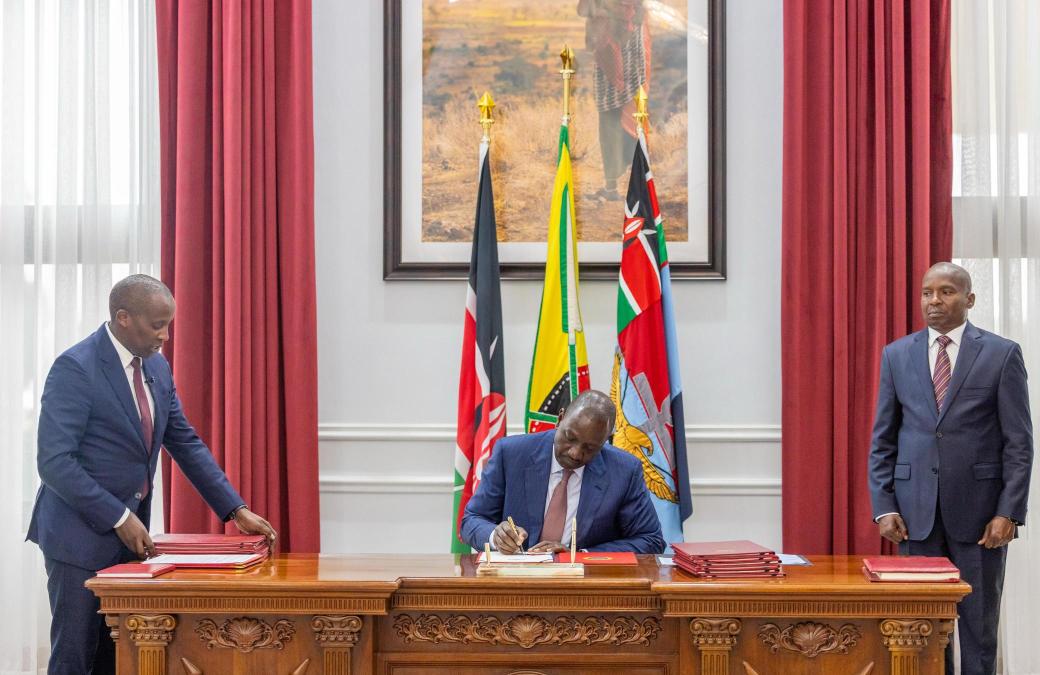President William Ruto has assented to the Conflict of Interest Bill, 2025, marking the end of a lengthy legislative process that saw sharp disagreements between Parliament and the Executive over key provisions of the anti-corruption law.
The bill, sponsored by National Assembly Majority Leader Kimani Ichung’wah, was first passed by the National Assembly in November 2023 and later by the Senate in May 2024.
However, amendments introduced during the bicameral process prompted the President to return the bill to Parliament with reservations, citing the need to restore at least 12 clauses he considered vital in addressing corruption and ethical misconduct in public service.
Following mediation between the two Houses, a final version of the bill was passed by the National Assembly on June 3, 2025, and by the Senate on July 23, 2025, with amendments that fully took into account the President’s concerns.
Ruto, however, assented to the bill on Wednesday morning at State House, Nairobi.
The new law repeals the Public Officer Ethics Act and establishes a consolidated legal framework for preventing and addressing conflicts of interest in public office.
It places the Ethics and Anti-Corruption Commission (EACC) at the centre of implementation and oversight, in line with Article 79 of the Constitution, which empowers the Commission to enforce leadership and integrity standards.
Among the key provisions in the Act are strict rules barring public officers from offering preferential treatment, engaging in incompatible private work, or entering into contracts that could interfere with official duties.
It also prohibits public officers from being influenced by offers of external employment or acquiring interests in entities that deal with their respective institutions.
The law requires public officers to declare their income, assets, and liabilities, including those of their spouses and dependent children, and recuse themselves from any matter in which they face a conflict of interest.
These declarations must now be submitted every two years to the relevant oversight bodies, with EACC providing supervisory oversight.
Notably, the law expands the scope of officials required to declare wealth to include the Chief Justice, Cabinet members, and Members of County Assemblies, categories not previously covered under the repealed law.
The bill also introduces a clear process for handling complaints. Any person may file a complaint with a reporting authority or directly with the EACC.
However, the law bars simultaneous investigations by both agencies on the same matter, unless the process is concluded within 90 days to prevent unnecessary delays.
During debate, one of the most contentious issues was the revised definition of conflict of interest. Senators removed a clause that would have treated dealings involving family members or close associates as a conflict unless declared.
Instead, they narrowed the definition to situations where a public officer fails to disclose a private interest.
President Ruto strongly opposed this narrowing of scope, warning that it undermines the fight against corruption. He argued that it disregards the accepted global standard, which recognises actual, potential, and perceived conflict of interest.
“The deletion weakens the law. It ignores how public officials use relatives or associates to indirectly benefit from decisions made in office,” Ruto had cautioned in his memorandum.
Despite this, the Senate’s Justice and Legal Affairs Committee rejected most of the President’s proposed changes.
“The Senate fully accommodates the President’s reservations to clauses 30, 31 and 35 of the Bill but does not accommodate reservations to clauses 2, 5, 6, 8, 12, 16, 17, 18, and 20,” read the report by committee chair Hillary Sigei.
The committee argued that including “perceived” conflicts would introduce vagueness and could hinder enforcement. “We recommend focusing on tangible and demonstrable conflicts to ensure clarity and effectiveness in governance,” the committee stated.
The Senators also refused to restore the broader definitions of “family” and “relative” that had been in the original bill.
Ruto had warned that omitting these terms could make it easier for corrupt officials to use relatives as proxies, but Parliament maintained that the narrower wording would ensure clarity.
Despite the back-and-forth, the signing of the bill into law is seen as a major milestone in Kenya’s efforts to entrench accountability within the public sector under a unified legal framework.

